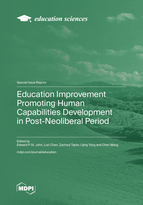Education Improvement Promoting Human Capabilities Development in Post-Neoliberal Period
A special issue of Education Sciences (ISSN 2227-7102).
Deadline for manuscript submissions: closed (1 June 2023) | Viewed by 25268
Special Issue Editors
Interests: critical and social theory; educational opportunity; educational policy; history
Special Issues, Collections and Topics in MDPI journals
Interests: history of American public education; educational policy study
Interests: education; linguistics; ability; technology; communication
Interests: higher education policy; economics of education; education finance; comparative and international higher education
Special Issues, Collections and Topics in MDPI journals
Interests: history of american public education; educational policy study
Special Issues, Collections and Topics in MDPI journals
Special Issue Information
Dear Colleagues,
During the neoliberal global period, nations pursued common agendas to adapt to global economic and education competition, market forces, and education for the uplift and support of democratic institutions. Once promoted by the World Bank, the International Monetary Fund, and international trade alliances, these themes have realigned economic and political alliances within and across nations with both developed and developing economies. In this context of shifting economic and political priorities and persistent class inequalities, even in democratic nations, education reforms should aim to build human capabilities, ensure the sustainability of populations in less-developed countries, sustain the contribution of education to evolved societies, and ensure financial wellbeing for marginalized citizens in developed economies.
The papers in this volume focus on addressing the contemporary challenges of educational improvement and promoting capabilities development across contexts. The articles address these challenges in China, the European Union, the United Kingdom, and the United States, compare developed and developing nations, and examine the policies and programs expanding educational opportunities. Using case studies and analyses of extant databases, the authors provide examples of using information systems and qualitative research to support the dual, competing aims of improving systems and improving program delivery to expand opportunities.
Prof. Dr. Edward P. St. John
Dr. Luxi Chen
Dr. Zachary Taylor
Dr. Lijing Yang
Prof. Dr. Chen Wang
Guest Editors
Manuscript Submission Information
Manuscripts should be submitted online at www.mdpi.com by registering and logging in to this website. Once you are registered, click here to go to the submission form. Manuscripts can be submitted until the deadline. All submissions that pass pre-check are peer-reviewed. Accepted papers will be published continuously in the journal (as soon as accepted) and will be listed together on the special issue website. Research articles, review articles as well as short communications are invited. For planned papers, a title and short abstract (about 100 words) can be sent to the Editorial Office for announcement on this website.
Submitted manuscripts should not have been published previously, nor be under consideration for publication elsewhere (except conference proceedings papers). All manuscripts are thoroughly refereed through a double-blind peer-review process. A guide for authors and other relevant information for submission of manuscripts is available on the Instructions for Authors page. Education Sciences is an international peer-reviewed open access monthly journal published by MDPI.
Please visit the Instructions for Authors page before submitting a manuscript. The Article Processing Charge (APC) for publication in this open access journal is 1800 CHF (Swiss Francs). Submitted papers should be well formatted and use good English. Authors may use MDPI's English editing service prior to publication or during author revisions.
Keywords
- education attainment
- education inequality
- education policy
- education statistics
- economic globalization
- future of tertiary education
- neoliberal
- social action
- social capital
- sustainability









